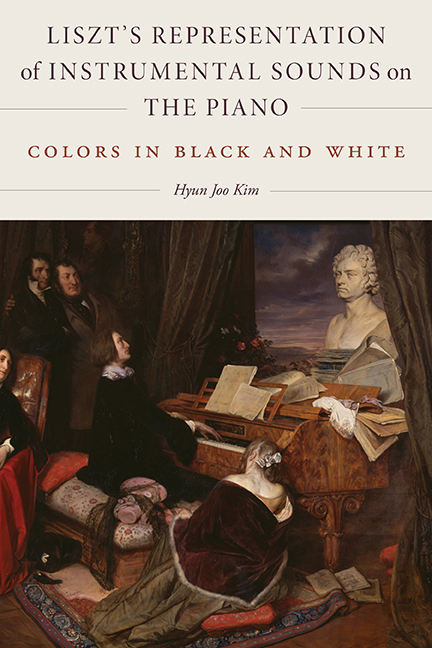Book contents
- Frontmatter
- Contents
- Introduction
- 1 Approaching the Reproductive Arts
- 2 “Partitions de Piano”
- 3 Between “Text” and “Event”: Liszt's Guillaume Tell Overture
- 4 Translating the Orchestra: Liszt's Two-Piano Arrangements of His Symphonic Poems
- 5 Interpretive Fidelity to Gypsy Creativity: Liszt's Representations of Hungarian Gypsy Cimbalom Playing
- Conclusions: Recurring Techniques and Aesthetics
- Appendix: Liszt's Preface to His Piano Arrangements of Beethoven's Fifth and Sixth Symphonies in the Breitkopf & Härtel Edition, 1840
- Notes
- Bibliography
- Index of Liszt's Works by Genre
- Subject Index
3 - Between “Text” and “Event”: Liszt's Guillaume Tell Overture
Published online by Cambridge University Press: 06 September 2019
- Frontmatter
- Contents
- Introduction
- 1 Approaching the Reproductive Arts
- 2 “Partitions de Piano”
- 3 Between “Text” and “Event”: Liszt's Guillaume Tell Overture
- 4 Translating the Orchestra: Liszt's Two-Piano Arrangements of His Symphonic Poems
- 5 Interpretive Fidelity to Gypsy Creativity: Liszt's Representations of Hungarian Gypsy Cimbalom Playing
- Conclusions: Recurring Techniques and Aesthetics
- Appendix: Liszt's Preface to His Piano Arrangements of Beethoven's Fifth and Sixth Symphonies in the Breitkopf & Härtel Edition, 1840
- Notes
- Bibliography
- Index of Liszt's Works by Genre
- Subject Index
Summary
In his famous conception of the Stildualismus (dualism of styles) that underpinned his Die Musik des 19. Jahrhunderts [Nineteenth-Century Music], published in 1980, Carl Dahlhaus called upon Beethoven and Rossini to make a broader aesthetic claim of the conceptual binary “text” and “event.” He argued that Beethoven and Rossini became symbolic progenitors that epitomize the “two cultures of music” fundamental to Western music. The “dualism of styles” that the two composers embodied presents the contrast between the score-based “text” and the performance-based “event.” The implications of this opposition rapidly develop early nineteenth-century dichotomies between German and Italian musical cultures, instrumental and operatic music, depth and surface, music as text and as practice, and “fidelity to score and improvisation.” The repercussions of Dahlhaus's conception produced a flurry of scholarly responses and critiques. The most recent approach is that leading scholars of both camps of Beethoven and Rossini have been in dialogue with each other. They analyze the philosophical and historiographical inferences of Dahlhaus's text–event dualism while simultaneously challenging the traditional binary constructions, and proposing new ways of understanding Beethoven and Rossini's music by freeing them from the discourse of duality in which they have become entangled.
Where do these modifications of the claimed Beethoven-Rossini text– event dualism leave us for understanding Franz Liszt's case? Liszt was one of the significant observers, practitioners, and participants in shaping and reshaping the legacy of the symbolic duo. He was a genuine, faithful interpreter and adherent of Beethoven through his wide array of roles as performer, composer, financial donor, and conductor, as represented in his deep engagement with the festivals surrounding the erection of the Beethoven monument at Bonn in 1845. Liszt also resolved to become a “conscientious translator” of Beethoven's music through his lifelong project of arrangements of the nine symphonies by Beethoven (1837–41, 1863–65). Liszt's relationship with Rossini is documented scantly, only in some general accounts. Nevertheless, Liszt's project in tribute to Rossini is evident in an array of his compositions “after” Rossini: his variations on excerpts from Rossini's early operas in 1829; his fantasies on songs from Rossini's collection of Les soirées musicales, 8 ariettas, and 4 duets in 1835; and his arrangement of Rossini's Guillaume Tell Overture (1838).
- Type
- Chapter
- Information
- Liszt's Representation of Instrumental Sounds on the PianoColors in Black and White, pp. 57 - 77Publisher: Boydell & BrewerPrint publication year: 2019



